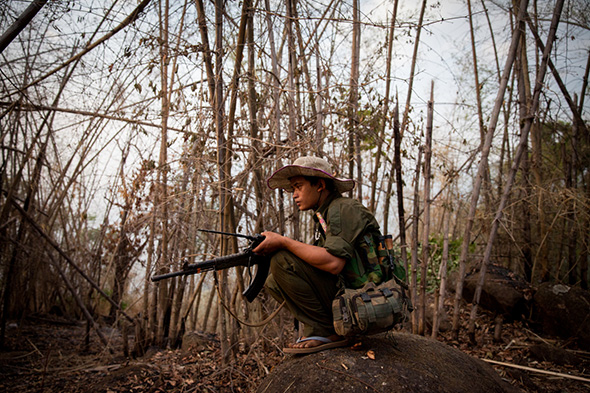
In this gallery
Photos by Diana Markosian
Day partying seemed like a harmless enough subject to report on in Burma. To circumvent parental and societal pressure to spend the evening hours at home, teenagers there held parties in the afternoon instead—a clever cultural workaround. But in this Southeast Asian country only recently released from the grip of a brutal, almost 50-year military junta, it turns out even lighthearted reporting evokes darkness.
My first inkling of trouble was when a would-be party guest in the former capital of Yangon informed me the event had been canceled. It was December 2013, and the Southeast Asian (SEA) Games were in full swing, hosted by Burma for the first time in over 40 years. The former manager of the party venue, "Jack," explained that the police had shut down all parties, worried about the image drunk and disorderly youth would create while foreigners were in town for the event. Jack was in his thirties and as candid as could be—until I asked his real name. Then he informed me he would be in trouble if I quoted him. Although the cancellation of the party had to do with concern over image, the response of Jack and others involved indicated a deeper problem: People were scared of their government, especially in regards to speaking with the media.
This fear was not tied to any direct threat so much as to the unknown power of a government that had yet to earn their trust—a government whose reporting rules, and the punishments for breaking them, were much less clear than during military rule.
For almost half a century, Burma was ruled by an isolationist military regime, and what was and wasn't allowed was relatively clear. But in 2010, elections were held for the first time in two decades, and long-time political prisoner Aung San Suu Kyi was released from house arrest. The following year a quasi-civilian government came to power, and in 2012, Western countries eased longstanding economic sanctions.
With these changes came advances in press freedom. Pre-publication censorship banning topics like poverty and oppositional leaders was abolished in 2012, and visas were issued to foreign reporters previously barred from the country. Around the same time, the Associated Press and the BBC opened official bureaus, imprisoned journalists were released, and exiled media groups returned. But restrictive laws from the military regime—like the often-cited act that bans content that would affect the morality of the public in a way that undermines the security of the government—still exist, and no new media law has been put in place.
This coexistence of old and new makes reporting an exercise in uncertainty. In the past, foreigners had trouble getting into Burma. Now they roam more freely, but their interactions with locals are watched. Simply speaking with foreigners made locals suspect, said Jack, explaining that once he had spent a night in jail after talking to a foreign tourist. It was clear that the newly opened Burma was not quite as open as it was often portrayed, and that reporting from the country was going to be more difficult than I had anticipated.
"A reporter working on a story about pirated movies was imprisoned for 'defamation,' 'using abusive language,' and trespassing"
Indeed, the pace of initial reforms has slowed, said Karin Deutsch Karlekar, project director, Freedom of the Press, Freedom House.
"There were these really big openings in 2011 and 2012, but the pace of opening has definitely slowed and there still are quite a few restrictions," said Karlekar.
In dozens of interviews with reporters and editors, Shawn Crispin, author of the 2013 Committee to Protect Journalists report, "Burma Falters, Backtracks on Press Freedoms," found that access is still restricted and authorities tend to treat the press as adversaries. According to the report, in 2012 a military colonel was demoted for giving unauthorized comments to Radio Free Asia, journalists are routinely restricted from accessing conflict areas, and a website that reported on government bombing of an ethnic group was later hacked. Freedom House also concluded in its 2013 report that Burma remains one of the more repressive countries in Asia in regards to press freedom.
- One Page
- 1
- 2
- 3
Source: http://www.news.myanmaronlinecentre.com/2014/07/07/reporting-in-burma/










No comments:
Post a Comment